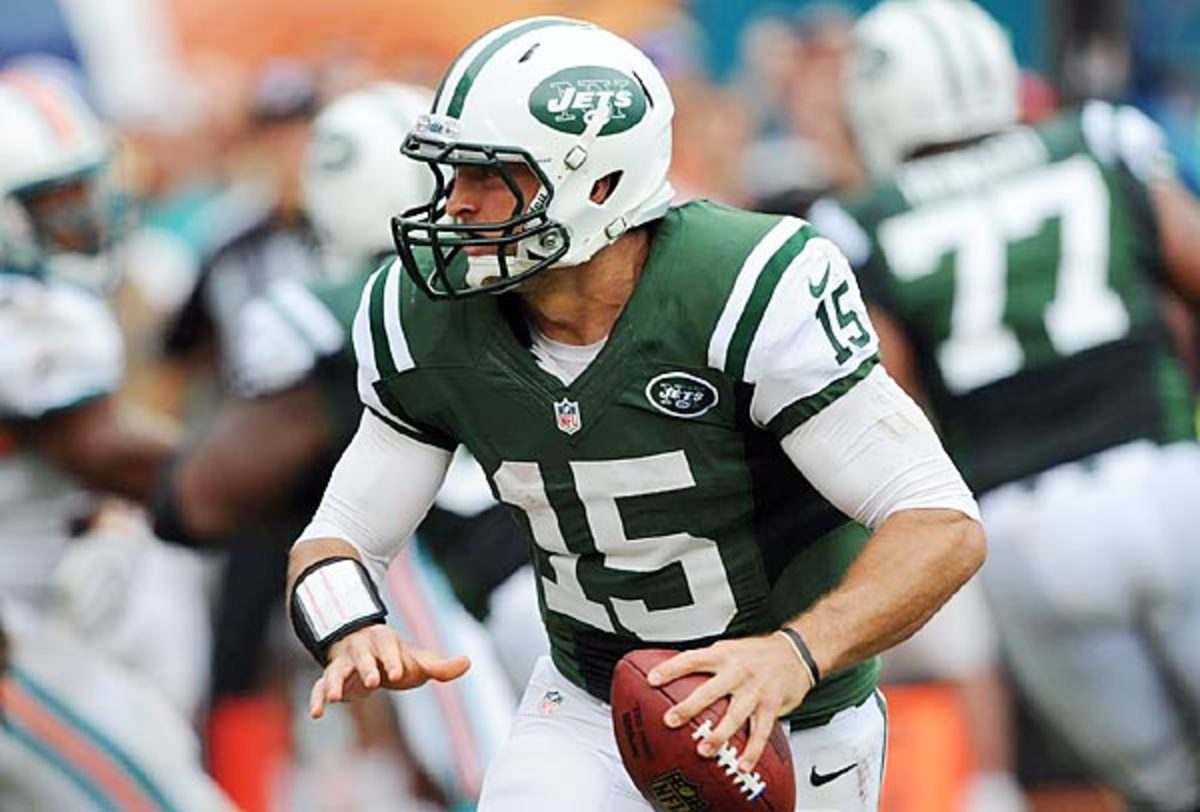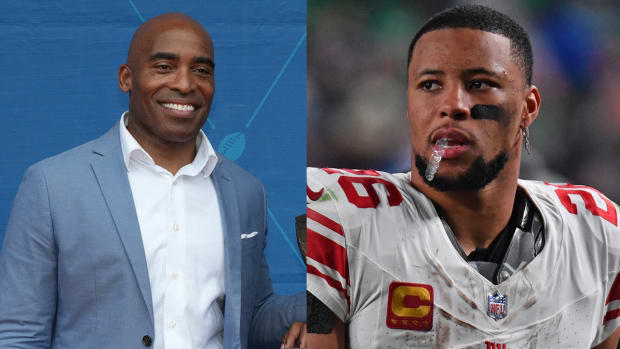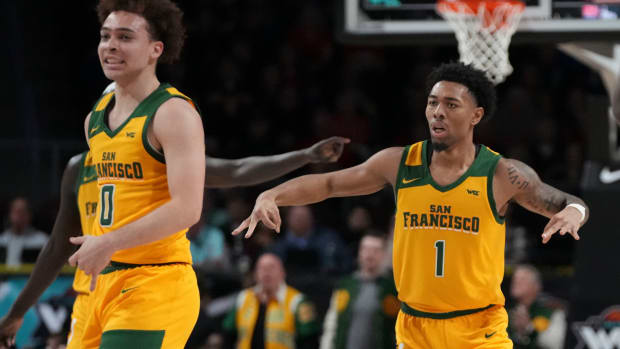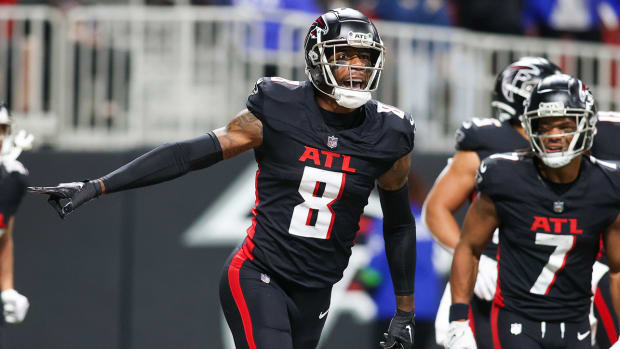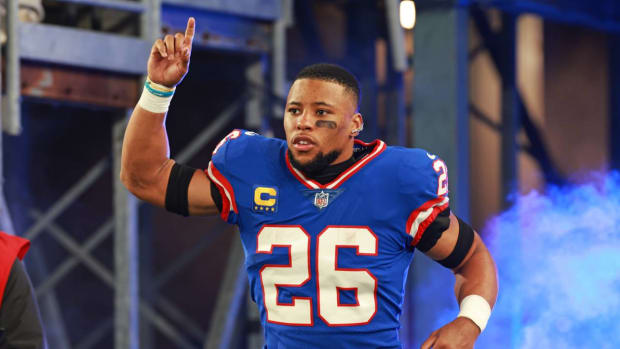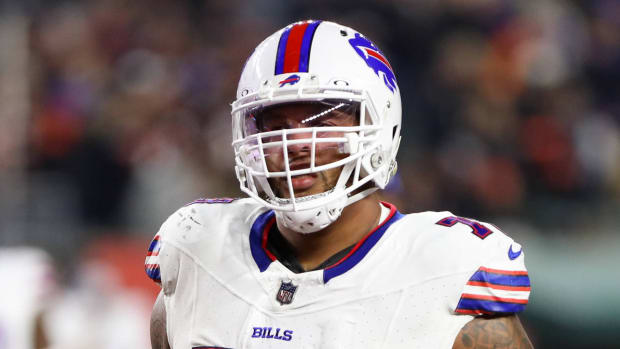The End Of The Beginning
Heinz Kluetmeier/SI
Tim Tebow was never going to fit in. Not in the inertial, stolid rank and file of pro football, where coaches survive by competing to see who can be the most risk-averse, where players are filed, stamped and indexed by measurables and dehumanized like GIs, where the average playing career (3.5 years) all but demands interchangeable parts. Before the now-former New York Jets' superstar backup quarterback was even drafted in 2010, a fourth-year offensive lineman from the Jaguars named Uche Nwaneri offered five unsolicited reasons why the greatest player in college football history was predestined to fail in the big leagues. Can't throw. Can't read a pro defense. Can only thrive in gimmick formations. Can't take a snap from the center. Can't throw.
Imagine the horror of Nwaneri, and the football establishment he represented, when a quarterback who couldn't do so much began racking up victories to rapidly become America's most trending athlete, "flawed mechanics" and "inconsistent release point" and "blurred field vision" be damned. Thrust into the starter's role in 2011 after the Broncos started 1-4, Tebow won. He won again. Six in a row. Cue the institutional backlash that came to define Denver's improbable surge to the AFC West title, as Tebow helmed a half-dozen come-from-behind victories in the fourth quarter or overtime. Otherwise insightful members of the NFL commentariat, mostly former players and coaches, had a way of transforming to knuckle-dragging Luddites when Tebow came up. They wouldn't understand it, dismissing it as smoke and mirrors, serendipitous timing and dumbfounding luck. His unorthodoxy was insufferable, offensive even, say nothing of Tebow's "Jesus act," as I once overheard a veteran NFL scribe cynically reduce it.
By cutting Tebow, the Jets effectively said everything that happened in Denver was a fluke. That Tebow is a lost cause, the limitations just too limiting. Because if the braintrust in Florham Park couldn't make it work, no one can, right?
Since the day he was drafted, the unapologetically devout signal-caller has led the league in misguided critics, who distrust the implications of Tebow almost as much as Tebow the quarterback. Not insignificantly, the thinly-veiled vitriol of his detractors is countered by his esteem within the locker room, for Tebow's inspirational qualities more than compensate for his technical flaws. He is hard. He is fearless. A leader of men. He gets the first down on 4th-and-1 when everyone in the stadium down to the peanut vendor knows he's keeping the ball. He is one of a kind. "Everybody looks at him from the outside," then-teammate Champ Bailey said amid the Broncos' charmed run. "They don't see what he has on the inside. Yeah, he might not be the greatest passer. But give him a chance at the end? I've never seen anything like it."
If football is religion in America, which it is, then Tebow is our Christ figure. Surely that's not to say he is Jesus. Yet what sportsman today is more worshiped and reviled (often irrationally on both counts), more ridiculed, overexposed and misunderstood? Thinkers far more qualified than present company have grappled with the meaning of Tebow since he became a cross-cultural phenomenon. What makes the struggle endlessly fascinating is that, at the center of this both intellectual and plebian maelstrom, a tumult of celebrity nowhere more grandiose than New York City, is by all credible accounts a fairly uncomplicated 25-year-old. Knows where he stands and isn't afraid to own it. Long on self-belief, short on artifice. Kind of reminds you of another plain-speaker who got into trouble for differences that were deemed subversive. "I just have a passion to play football," Tebow said the day he was drafted. "When you do things different than other people sometimes do them, and you don't settle for just being average, you open yourself up for criticism. But I'm ready for it. I've learned to live with it. I never just wanted to do things the same way as everybody else does."
His 2012 began with a playoff win over the heavily favored Pittsburgh Steelers, during which Tebow threw for a career-high 316 yards and two scores against the NFL's top-ranked defense—including a game-winning 80-yard touchdown pass in overtime—and set the franchise record for quarterback rating in a postseason game (125.6). No smoke and mirrors there. The top search item on Google the next day? John 3:16. A prophet for the meme generation.
Yet it's how Tebow handled the 15 months since that career pinnacle that's made him even more compelling.
By March 2012, Tebow ranked fourth on the Davie-Brown index, which measures worldwide celebrity. That same month, the Broncos signed Peyton Manning, which made Tebow expendable. (That Tebow's playoff winning percentage of .500 is greater than Peyton's .450 is both irrelevant and an amusing easter egg.) "Tebow to Gomorrah" was the the National Review headline when he was traded to the Jets, a deal that was called "logic-defying" given the still-wet ink on the contract extension of incumbent starter Mark Sanchez. More than 200 reporters attended Tebow's introductory press conference. The tabloids licked their chops. During training camp, The New York Times devoted 36 column inches to a straight-faced trend piece on Tebow's virginity. The five boroughs braced for Tebowmania, Gotham style. Since then? Not a whole lot. The Jets were a moribund 6-10. Tebow was used for a perfunctory number of plays, finishing with eight pass attempts, six completions, 32 rushes for 102 yards and no touchdowns.
Within four years Tebow has gone from legend to curiosity-cum-phenom to benchwarmer to skid row. Yet it’s this last stage—spectator—that’s made him immensely relatable. Who among us mortals hasn’t been made to wait for something we believe in our hearts we deserve, that we’re destined for, whether it’s a raise or a promotion or a college acceptance letter? Who hasn’t been haunted by our unfulfilled potential within? Who hasn’t grown frustrated by the obstacles in our path, by circumstances that come to resemble prison bars? Whose conviction hasn’t been tested? The waiting defines our being, how we see ourselves. If the unforgettable ride of Tebow's 2011 was a lesson of self-belief rewarded and the triumph of the individual over groupthink, the moral of everything that's happened since is one of patience and faith under trial.
Tebow's response? He did an extraordinary job of not being a distraction in a locker room that not only engenders being a distraction but has elevated it to performance art. While it tortured him to stay on the sidelines, he did nothing to leverage the situation in his favor, even as the starter's performance did everything to invite a quarterback controversy. (Buttfumble, anyone?) He avoided one trap question after another like an expert minesweeper. He never pouted or whined or pointed fingers. No hint of discontent on a Twitter feed that's remained boilerplate. Just the same Tebow, earnest and unflagging, as willing a teammate as ever. A man waiting for his number. And still he waits.
The Christian Soldier is a hopelessly outmoded archetype—Where have you gone, Eric Liddell?—sepia-toned nostaligia as quaint as transistor radios, corner malt shops and leaving the front door unlocked after sundown. What hope did America's most celebrated man of faith have in the secular capital of the world? It turned out not much. In a city of 8 million dreams Tebow, impossibly, never quite fit in. But when he finally gets his next shot—New England? San Diego? Seattle?—there's no doubt he'll be ready.
